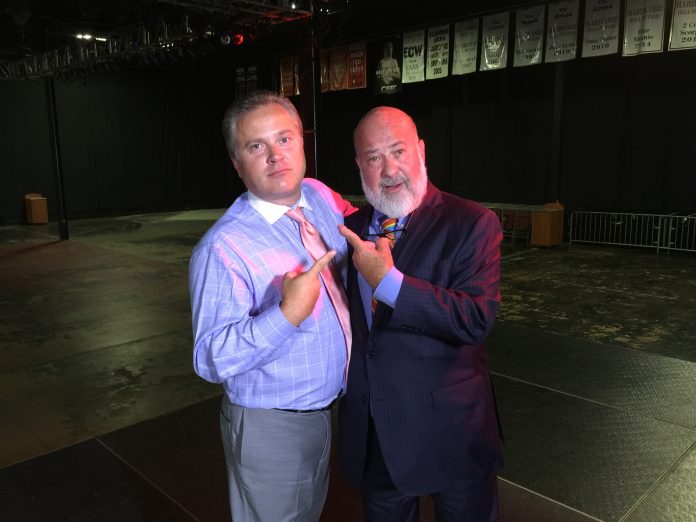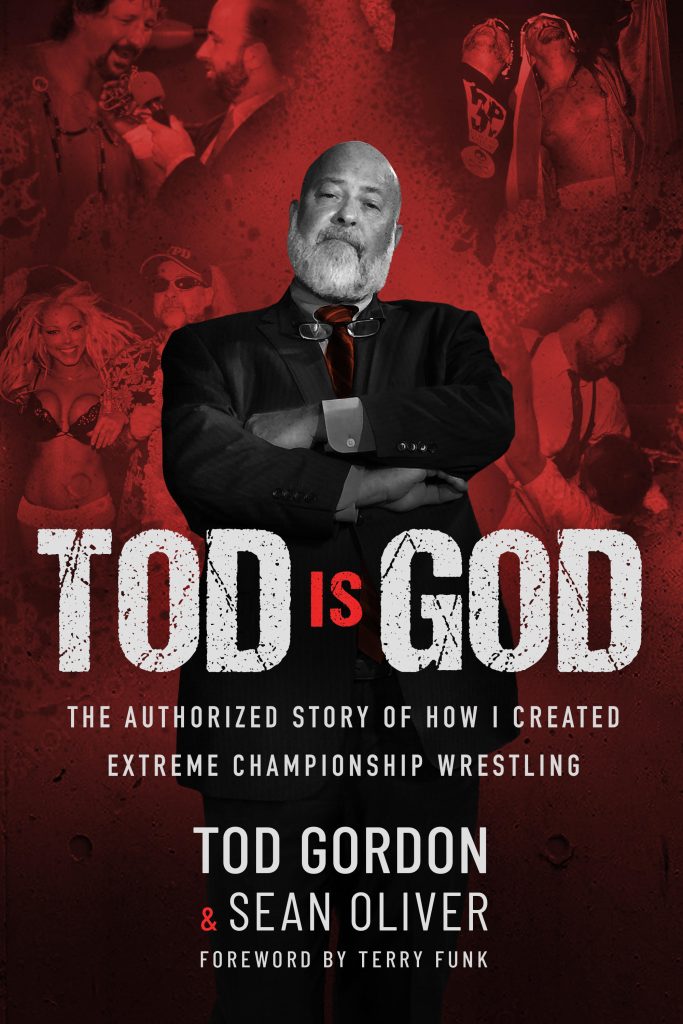Tod Gordon didn’t set out to change the state of pro wrestling.
But he certainly did.
Gordon was a lifelong wrestling fan growing up in Upper Darby. He remained a fan of the old-school WWWF, and it was something he never outgrew.
“The day I started watching TV, I started watching wrestling,” Gordon said. “Bruno Sammartino, Chief Jay Strongbow, Bulldog Brower. I never thought about being a wrestler, I was just really entertained by it. Every Saturday, Roller Derby and wrestling. We didn’t get anything else.”
He stayed a wrestling fan, and years later, he was flipping through the radio stations and landed on WIP. Every Saturday morning, a show called Rasslin Radio aired. It didn’t last long, just a few years, but it changed Gordon’s life.
“Joel Goodhart had a radio show on WIP, I heard it, a mainstream radio station talking about wrestling?” Gordon said. “One show he asked if anyone wanted to have a star come to their business. He could get any star out there to do a personal appearance.
“Of course I picked (woman manager known for being beautiful) Missy Hyatt, so she came (to Gordon’s jewelry store) and was great, she laid across the counter. She was great.”
Goodhart at the time was running the Tri-State Wrestling Alliance, a promotion that was known for putting on dream matches in the Philly area.
Gordon started helping out.
He invested some money, but it wasn’t long before Goodhart ran out of money. It wasn’t because he wasn’t doing great shows, it was because he brought in the top wrestlers in the world, and spent a lot of money.
Goodhart called it quits. Gordon stepped up.
“When he went bankrupt, ring announcer Bob Artse, Larry Winters and Steve Truitt all came in my office and asked me if I would keep things going,” Gordon said. “At the time, we were running shows at Mike Schmidt’s Sports Bar. They didn’t want it to end, they talked me into doing it.
“It was a fun little hobby that turned into a national pay per view. It’s hard to believe.”
Tri-State Wrestling became Eastern Championship Wrestling. A few years later, it became Extreme Championship Wrestling, and thanks to Gordon’s baby, the entire landscape of wrestling changed.
And now the entire story is being told.
On July 25, Gordon is releasing “Tod is God,” a book that tells the story of how a small promotion in Philly became the talk of the wrestling world. Tod is God was one of the many creative chants that broke out at the ECW Arena in South Philly because Gordon was giving the fans exactly what they wanted.
ECW was known for adult storylines. At the same time, WWF and WCW, the two biggest promotions, were geared toward younger fans.
But it was more than that. The promotion ran sold-out monthly shows at the ECW Arena, and it offered what many fans considered the best entertainment.
In the early days, guys like Terry Funk, Abdullah the Butcher, Stan Hansen, Superfly Jimmy Sunka and Road Warrior were mainstays. He also gave young guys a chance. He helped Shane Douglas become the “Franchise.” Before he was Stone Cold, Steve Austin was a Superstar in ECW, and Mick Foley might have been better as Cactus Jack than he was as Mankind.
ECW also created stars like Public Enemy, Raven, the Dudley Boyz and Stevie Richards, an Abraham Lincoln High School grad who was one of the key players in the early days of ECW. He wrestled in the first ECW match, and then helped main event the first pay per view in 1997.
But the guy who was the heart and soul of ECW was the Sandman. That was far from the case when he began his ECW career.
“He was wearing a surfer outfit and a surfboard and it wasn’t (popular),” Gordon said. “It was WWFish. He’s not a plumber or a pig farmer, they were throwing that at us. Papa Shango putting spells on people. It’s not real. Come out as he is.
“(Sandman) is a roofer, and at the end of the day he gets drunk, gets into a fight, that’s who he is. Make him be himself. All personality and lives instead of coming out as a character. I said give him a cigarette and a beer. Paul (Heyman) said, ‘You can’t do that. It’s never been done.’ And? Well, we did it. It got over like crazy.”
Gordon had a great relationship with the wrestlers. To this day, his best friends are Sandman, 2 Cold Scorpio and, believe it or not, his biggest rival, “Fonzie.” And that relationship made him a great boss.
“I shot straight with them, I enjoyed their company,” Gordon said. “And if they wanted to leave and go to WCW, God bless you. I can’t pay you $300,000 a year. Paul (Heyman) found that to be a mark against them, they were hurting him. Sabu broke his neck for $500 a show. How can you begrudge him making $200,000? I wouldn’t feel that way if they were making the same money, but they were making huge money I couldn’t pay”.
Gordon not only funded ECW, but was a key member of the creative team, while also being the on-screen commissioner who would mix it up with evil referee Bill Alfonso when he was cheating the fans out of action.
Over the years, the story has changed, and ECW has continued to grow years after it went out of business. Fans still chant the three letters when something fun happens at a show. WWE actually relaunched ECW for a few years to get the fans back into it. But no matter what, nothing could create the fun that Gordon’s ECW brought to Philly.
“I didn’t want to write a book, to be honest, but Sean Oliver from KAYFABE Commentaries, I did two DVDs that did well, and we had a great rapport. We were on the phone and I told him a story, and he said, ‘You got to write a book.’
“Everyone sees it as Paul Heyman’s ECW, so I’ve become a forgotten person. As long as the people who know know, I can live with it. Every book or DVD, like the Rise and Fall of ECW or Hardcore Revolution, I was never once interviewed. I was the one who started it. I ran it day and night. I would like to tell the authorized version.”
Fans can now hear that. New fans can learn about what it was like. Old fans will be entertained by new stories.
And Gordon will enjoy it, too, because he’s still a huge wrestling fan.
“All of it is humbling,” Gordon said. “People still yell, ‘ECW.’ Fans were such a huge part of the promotion. It was the Rocky Horror Picture Show with weapons, chants, ready for every wrestler. We never put on crap and never lied. If a tag team lost and had to break up, we did it. If someone was going to unmask, they unmasked. Bra and panties match? We stripped them to their bra and panties. No screwjob covering girls up, or someone would have a second mask on. I resented that. I’ll do the exact opposite. I’m a fan and I’m enjoying it, hardcore ECW fans would as well.”
And he truly left his mark on the sport. ECW brought the reality of wrestling you see each week in WWE and AEW.
“I was a lucky guy who caught lightning in a bottle,” Gordon said. “I was a Howard Stern fan, and he wasn’t meant for terrestrial radio. He was meant for satellite. We were the Howard Stern of wrestling. And people loved it.”
Gordon’s book will be available Tuesday in bookstores and online, including at Amazon, Simon & Schuster and Barnes and Noble.







